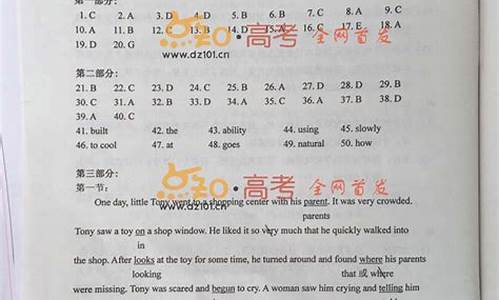您现在的位置是: 首页 > 教育研究 教育研究
2015新课标一卷英语,2015高考课标1英语
tamoadmin 2024-06-14 人已围观
简介1.2015年广西高考用的是什么卷子2.高考全国卷(新课标卷)一卷,英语,分值分布?3.哪些城市高考使用新课标卷,分别是从那一年开始的4.高考英语全国卷1和全国卷2的区别在哪里?比如难度,题型,或者教材版本(大纲OR新课标)5.全国卷高考试卷难度怎么样,2015全国卷高考试卷难度 2015年高考英语一轮复习题库:Module6 Unit 3 Understanding each other Ⅰ
1.2015年广西高考用的是什么卷子
2.高考全国卷(新课标卷)一卷,英语,分值分布?
3.哪些城市高考使用新课标卷,分别是从那一年开始的
4.高考英语全国卷1和全国卷2的区别在哪里?比如难度,题型,或者教材版本(大纲OR新课标)
5.全国卷高考试卷难度怎么样,2015全国卷高考试卷难度

2015年高考英语一轮复习题库:Module6 Unit 3
Understanding each other
Ⅰ.单项填空
1. They have been accustomed to the climate here and ______ a cold bath in winter as well.
A. taking B. to take
C. taken D. take
2. According to the school rules, nobody is permitted ______ in the classroom.
A. *** oking B. to *** oke
C. *** oke D. to be *** oking
3. I don't want to ______ too much of your time, but I do have some important matters.
A. keep up B. pick up
C. make up D. take up
4. The police in Hubei province ______ last Tuesday they had arrested 7 people for their suspected roles in a shooting killing 1 and injuring 10 others on Monday evening.
A. has said B. said
C. had said D. says
5. In the eastern part of New Jersey ______, a major shipping and manufacturing center.
A. the city of Elizabeth lies there
B. around the city of Elizabeth lies
C. there lies the city of Elizabeth around
D. lies the city of Elizabeth
6. — Are your family ready for rafting?
— Yes, I really want my children to experience that ______ they are young. (2013?师大附中月考六)
A. while B. before
C. unless D. if
7. I would like to travel to Tibet. That's ______ I'd do if had enough time and money.
A. which B. why
C. what D. when
8. With two children ______ middle school in the nearby town, the parents are working hard.
A. to attend B. attended
C. attending D. attend
9. — Do you like living here?
— Yes, but I am still ______ to the new time zone.
A. adjusting B. adjusted
C. adapted D. used
10. — Why didn't you answer my phone last night?
— Sorry. I ______ a meeting when you called me.
A. am attending B. was attending
C. attended D. have attended
11. He is never afraid of changes in his life, ______ them as valuable experiences. (2014?长沙一中月考四)
A. viewing B. to view
C. viewed D. having viewed
12. More than 30 cars of the new kind ______ in the first three days after its launch last Saturday. (2014?湖南师大附中月考二)
A. sold B. has sold
C. were sold D. has been selling
13. When the famous singer got there, she did not get the warm ______ she had hoped for.
A. situation B. reception
C. invitation D. celebration
14. The Chinese munity here are shooting off five works in ______ of the Chinese New Year.
A. celebration B. honor
C. memory D. consideration
15. It would have make a lot of ______ if you had told me about it two days earlier.
A. effort B. difference
C. oute D. result
Ⅱ.完形填空
A
(2013?全国新课标卷改编) Michael Greenberg is a very popular New Yorker. He is not famous in sports or the arts. But people in the streets __1__ him, especially those who are poor.
For those people, he is “Gloves” Greenberg. How did he get that __2__? He looks like any other busines *** an, wearing a suit and carrying a briefcase (公文箱). But he's __3__. His briefcase always has some gloves.
In winter, Mr. Greenberg does not act like other New Yorkers, who look at the sidewalk and hurry down the street. He looks around at __4__. He stops when he __5__ someone with no gloves. He gives them a pair and then he moves on, looking for more people with cold __6__.
On winter days, Mr. Greenberg __7__ gloves. During the rest of the year, he buys gloves. People who have heard about him __8__ him gloves, and he has many in his apartment.
Mr. Greenberg __9__ doing this 21 years ago. Now, many poor New Yorkers know him and __10__ his behavior. But people who don't know him are sometimes surprised by him. They don't realize that he just wants to make them happy.
It runs in the __11__. Michael's father always helped the poor as he believed it made everyone happier. Michael Greenberg feels the same. A pair of gloves may be a __12__ thing, but it can make a big difference in winter.
1. A. know about B. learn from
C. cheer for D. look for
2. A. job B. name
C. chance D. message
3. A. calm B. different
C. crazy D. curious
4. A. cars B. people
C. street numbers D. traffic lights
5. A. helps B. chooses
C. greets D. sees
6. A. hands B. ears
C. faces D. eyes
7. A. searches for B. stores up
C. gives away D. puts on
8. A. call B. send
C. lend D. show
9. A. delayed B. remembered
C. began D. enjoyed
10. A. understand B. dislike
C. study D. excuse
11. A. city B. family
C. neighborhood D. pany
12. A. *** all B. useful
C. delightful D. forting
B
(原创)I have often found it interesting talking to foreigners and learning about the cultural differences between countries. I think 1.__________ is important to know about the customs and traditions of different countries in order to avoid misunderstanding.
Last Saturday, I met a man from France, 2.__________ explained to me how the French greet each other. Now I know the French usually shake hands when they meet. If they know each other very well, they kiss each other 3.__________ the cheek. They shake hands again when they are saying goodbye. It isn't unusual for a French person who you met several minutes ago to e and shake hands with 4.__________ again! This is just one of the many French traditions. If you went to live in France, you might find it hard to adjust 5.__________ their ways.
Almost every culture in the world has its own taboos, and it is important to be aware of them. Breaking a taboo could be 6.__________ experience that will upset those around you. For example, in Japan, “4” and “9” are considered to be numbers that are unlucky, 7.__________ the Japanese words for these two numbers sound like “death” and “suffering”. It would be important to know this if you 8.__________ like to visit Japan on holiday.
Ⅲ.阅读理解
(2013?江西) The light from the campfire brightened the darkness, but it could not prevent the damp cold of Dennis's Swamp (沼泽地) creeping into their bones. It was a strange place. Martin and Tom wished that they had not accepted Jack's dare. They liked camping, but not near this swamp.
“So,” Martin asked as they sat watching the hot coals. “How did this place get its name?”
“Are you sure you want to hear it? It's a scary story,” warned Jack.
“Of course!” cried out Tom. “If there were anything to be scared of, you wouldn't have chosen this place!”
“OK, but don't say I didn't warn you,” said Jack, and he began this tale.
Way back in time, a man called Dennis tried to start a farm here. He built that cottage over there to live in. In those days, the area looked quite different — it was covered with tall trees and the swamp was a crystal?clear river. After three hard years, Dennis had cleared several fields and planted crops. He was so proud of his success that he refused to listen to advice.
You are clearing too much land, warned one old man. The land is a living thing. It will hit back at you if you abuse it.
Silly fool, said Dennis to himself. If I clear more land, I can grow more crops. I'll bee wealthier. He's just jealous!
“Dennis continued to chop down trees. Small animals that relied on them for food and shelter were destroyed. He was so eager to expand his farm that he did not notice the river flowing slowly towards his door. He did not notice salt seeping to the surface of the land. He did not notice swamp plants choking all the native plants.”
“What happened?” Martin asked. It was growing colder. He trembled, twisting his body closer to the fire.
“The land hit back — just as the old man warned,” Jack shrugged. “Dennis disappeared. Old folks around here believe that swamp plants moved up from the river and dragged him underwater. His body was never found.”
“What a stupid story,” laughed Tom. “Plants can't…” Before he had finished speaking, he screamed and fainted (晕倒). The other two boys jumped up with fright, staring at Tom. Suddenly, they burst out laughing. Some green swamp ivy (常春藤) had covered Tom's face. It was a while before Tom could appreciate the joke.
1. The underlined word “dare” in Paragraph 1 is closest in meaning to ______.
A. courage B. assistance
C. instruction D. challenge
2. Why did Jack tell Tom and Martin the story?
A. To frighten them.
B. To satisfy their curiosity.
C. To warn them of the danger of the place.
D. To persuade them to camp in the swamp.
3. Why did Dennis ignore the warning of the old man?
A. The old man envied him.
B. The old man was foolish.
C. He was too busy to listen to others.
D. He was greedy for more crops.
4. Why did Tom scream and faint?
A. He saw Dennis's shadow.
B. He was scared by a plant.
C. His friends played a joke on him.
D. The weather became extremely cold.
5. What lesson can we learn from the story of Dennis?
A. Grasp all, lose all.
B. No sweat, no sweet.
C. It is no use crying over spilt milk.
D. He who makes no mistakes makes nothing.
Ⅳ.阅读简答
(2014?雅礼高三月考一) David Jones is probably not somebody you want to hang out with. Not because he isn't a cool person, but because he is living with 40 deadly snakes.
Jones is living in a room for 121 days with more than three dozen constrictors, green mambas, boomslangs and other deadly snakes in an attempt to set a Guinness world record. The record for most days spent confined to a room with this particular number of snakes is 113, set by Martin Smith in 2008.
“I am hoping people will realize that we can live with these fantastic creatures without fearing and killing them. People e and see me here and are constantly amazed at how I am interact with these animals. The snakes are not restrained in any way and make the full use of the entire room including my bed, shower and toilet,” Jones explains. They mainly hide out in cupboards or on the various makeshift (临时的)branches or bushes that Jones has in their shared quarters. Once a week, someone brings captured mice and rats to offer as a sacrifice to the snakes.
David Jones is forced to move the snakes with a “hook stick” throughout the day, so that he can do things like sitting at his desk or typing on his laptop, his only means of contacting the outside world.
The snakes often drop on his pillow or shoulders as he's trying to work or sleep, but there have so far been no instances of Jones being bitten by one of these deadly snakes. He said, “if I give them respect, we can live together happily.”
Jones is doing this for charity. All the money raised will go to a hospice(收容所) in his hometown of Crawley, near London.
1. What are constrictors, mambas and boomslangs? (No more than 5 words)
________________________________________________________________________
2. How is David Jones staying in touch with other people? (No more than 5 words)
________________________________________________________________________
3. Why don't the snakes bite Jones? (No more than 6 words)
________________________________________________________________________
4. What are the purposes of David Jones's doing so? (No more than 15 words)
________________________________________________________________________
Unit 3
Ⅰ.1. A 考查固定搭配。从句末的as well 可知,我们已经习惯了这里的天气也习惯于冬天洗冷水澡。be accustomed to (doing) sth.习惯于某事或做某事。
2. B 考查动词搭配。注意permit 的搭配: permit doing, permit *** . to do。permit 用于被动语态时,要用be permitted to do…
3. D 考查短语动词的辨析。 句意:我不想占据你太多的时间,但是我确实有重要的事情。 keep up 坚持,维持; pick up 捡起,拾起; make up 编造; take up 占据(时间或空间)。
4. B 考查动词时态。由于上个星期二说的,所以用一般过去时。
5. D 考查倒装句。在“主语+谓语+地点状语”的句型中,如果强调地点状语,就把地点状语放于句首,后常用完全倒装的句型,即:地点状语+谓语+主语。
6. A 考查状语从句。experience是及物动词,that作其宾语,其后是一个状语从句。此句的意思是:我想趁孩子们小的时候体验漂流。
7. C 考查名词性从句。what 在此引导的是表语从句。
8. C 考查非谓语动词。children与attend 之间构成主动关系,所以要用现在分词作with复合结构的宾补。
9. A adjust to 适应。
10. B 考查时态。该句用过去进行时符合语境。句意:你给我打电话时,我正在开会。
11. A 考查非谓语动词的用法。 句中的view与主语he是意义上的主动关系,且view在句中充当状语的成分,所以选A。
12. C 考查时态和语态。根据后面的时间状语应在过去时里选择,且主语cars与sell之间是构成被动关系,所以选C。
13. B reception 接待。
14. A in celebration of… 庆祝……
15. B make a difference 产生不同,有区别。
Ⅱ.A 1. A 作者在文章的开头的第一句话告诉我们:“迈克?格林伯格是一个非常受欢迎的纽约人。”四个选项中,能与popular 对应的近义词应为 A. know about (了解,知道关于……的情况)。B.向……学习;C.为……欢呼,加油;D.寻找。
2. B 设空所在句的意思是:对于那些人来说,他是“手套” 格林伯格。他的这个名字是如何得来的呢?故B项name符合上下文语境。
3. B 设空处上下文句意为:“他看上去就像任何其他的商人,穿西装,带着一个公文包。但他也有不同之处。他的公文包里总放有一些手套。”设空处前面的but 非常重要,它表示转折,different表并不一样。
4. B 根据下文作者提到主人公要寻找没有手套的穷人赠送手套,所以他在街上环顾四周要看的是“行人”,B项people 与上下文相符,本段最后一句提到looking for more people with cold ______.也为此作了注解。
5. D 句意为:当他看到没戴手套的人时会停下来。作者上文特别提到“look around”, 而与之相对应的结果应该是“看到”, 所以D为正确答案。
6. A 手套是为冬季感到手冷的人保暖所用,故A项hand与上下文语义相符。
7. C 根据全文可知主人公在冬季纽约街头做的是赠人手套的义举,故C项give away (赠送) 最能表达上述含义。
8. B 设空所在句的句意是:听说他这一义举的人们给他寄去手套,这样他在他的公寓里积攒了许多副(手套),B项send(寄送)符合题意。
9. C 设空所在句的句意为: 格林伯格先生做这一义举开始于21年前。C项begin(开始),符合题意。
10. A 句意为: 现在,许多贫穷的纽约人知道了他,也理解了他的行为。根据作者But后的描述“也有一些人对他的行为产生误解”来看,只有A才是最佳选项。
11. B 设空所在句的句意为:这种义举一直在他们家族内传承。根据下文所述, 主人公的父亲也一向热衷于帮助穷人,可以看出主人公的这一做法是有家庭影响的。
12. A 句意:一副手套可能是微不足道的小事,但它在冬季能产生很大的意义。but前后的句子具有明显的转折含义,所以选A,此句也是整篇文章的寓意所在。
B 1. it 2. who 3. on 4. you 5. to 6. an 7. because/since/as 8. would
Ⅲ.1. D 词义猜测题。根据文章第一段可知这个地方很诡异,Martin和Tom 感到害怕,都希望没有接受Jack的大胆挑战。 A.勇气;B.帮助;C.指导;D.挑战。
2. B 细节理解题。 根据文章第三段和第四段中的“Are you sure you want to hear it?” 和 “Of course!” 可得出答案。
3. D 细节理解题。 根据文章倒数第五段中的“If I clear more land, I can grow more crops. I'll bee wealthier.”可知他想种更多的农作物。
4. B 推理判断题。 根据文章最后一段的“Some green swamp ivy(常春藤) had covered Tom's face.”可知,Tom是因被常春藤的叶子盖到脸部而吓到了。
5. A 主旨大意题。 文章讲到了Dennis太贪婪,不断地开垦土地想把所有土地都种植农作物以获取更多金钱而受到大自然的报复,所以选A(贪多必失)。B.没有汗水,没有收获;C.覆水难收;D.不犯错误的人是不会有收获的。
Ⅳ.1. They are deadly snakes.
2. By using his laptop./Through his laptop.
3. Because he gives them respect./ Because he respects them.
4. To set a Guinness world record and to raise money for charity./He wants to set a Guinness world record and to raise money for charity.
2015年广西高考用的是什么卷子
2016年使用全国一卷(新课标一卷)的省份有:安徽、湖北、福建、湖南、山西、河北、江西、广东、河南、山东(英语及综合)
一、全国卷:
高考试题全国卷简称全国卷,是教育部为未能自主命题的省份命题的高考试卷。分为新课标Ⅰ卷和新课标Ⅱ卷。新课标Ⅰ卷的难度比新课标Ⅱ卷难度大。小语种(日语/俄语/法语/德语/西班牙语)高考统一使用全国卷,各省均无自主命题权,且不分新课标Ⅰ卷和新课标Ⅱ卷。
二、使用新课标一卷的省份:
1.2015年使用省份:河南 河北 山西 陕西(语文及综合)湖北(综合)江西(综合)湖南(综合)
2.2015年增加使用省份:江西(语文 数学 英语)、山东(英语)
三、使用新课标二卷的省份:
1.贵州 甘肃 广西 青海 西藏 黑龙江 吉林 宁夏 内蒙古 新疆 云南 辽宁(综合)海南(语文 数学 英语)
2.2015年增加省份:辽宁 (语文 数学 英语)
3.2016年增加省份:重庆、四川(语文,文综)
四、自主命题的省份:
北京市:所有科目全部自主命题
天津市:所有科目全部自主命题
上海市:所有科目全部自主命题
重庆市:所有科目全部自主命题
安徽省:所有科目全部自主命题
山东省:自主命题(语、数、理综、文综)+新课标Ⅰ卷(英)
广东省:所有科目全部自主命题;2016年起全部使用全国卷;英语听说考试由广东省自主命题
江苏省:所有科目全部自主命题
浙江省:所有科目全部自主命题
四川省:所有科目全部自主命题
福建省:所有科目全部自主命题,英语听力使用新课标全国卷英语听力;2016年起全部使用全国卷。
湖北省:自主命题(语、数、英)+新课标Ⅰ卷(文综、理综);2016年起全部使用全国卷
湖南省:自主命题(语、数、英)+新课标Ⅰ卷(文综、理综)
陕西省:新课标Ⅰ卷(语、数、英、文综、理综)
高考全国卷(新课标卷)一卷,英语,分值分布?
目前使用全国卷的省份
新课标一卷
河南河北山西全部
江西全部(2015高考改革)
山东英语(2015高考改革)
福建英语(2015高考改革)
陕西语文及综合
湖北综合
湖南综合
新课标二卷
贵州甘肃青海西藏黑龙江吉林宁夏内蒙古新疆云南辽宁全部
海南语数外
广西(2014年高考广西将最后一次使用大纲版全国卷,广西2015年起使用新课标全国卷Ⅱ)
自主命题省份
北京、天津、上海、重庆、安徽、广东、江苏、浙江、四川所有科目全部自主命题
山东省:自主命题(语、数、理综、文综)+新课标Ⅰ卷(英)
福建省:所有科目全部自主命题,英语听力使用新课标全国卷英语听力
湖北省:自主命题(语、数、英)+新课标Ⅰ卷(文综、理综)
湖南省:自主命题(语、数、英)+新课标Ⅰ卷(文综、理综)
陕西省:自主命题(数、英)+新课标Ⅰ卷(语、文综、理综)
辽宁省:自主命题(语、数、英)+新课标Ⅱ卷(文综、理综)
海南省:自主命题(政、史、地、理、化、生)+新课Ⅱ卷(语、数、英)
哪些城市高考使用新课标卷,分别是从那一年开始的
英语全国卷1:总分150分。听力30分(短对话7.5分;长对话或独白22.5分);阅读理解40分(第1-4篇阅读30分;第5篇为7选5,10分);英语知识运用45分(完形30分,15空/题,每题2分;语法填空15分,10空/题,每题1.5分);写作35分(改错10分,10个错,每个1分;作文25分)。
高考英语全国卷1和全国卷2的区别在哪里?比如难度,题型,或者教材版本(大纲OR新课标)
2007年 广东、山东、海南、宁夏。
2008年 广东、山东、海南、宁夏、江苏。
2009年 广东、山东、海南、宁夏、江苏、福建、浙江、辽宁、安徽、天津。
2010年 广东、山东、海南、宁夏、江苏、福建、浙江、辽宁、安徽、天津 北京、湖南、黑龙江、吉林、陕西。
扩展资料:
海市方案:
必考科目:语文/数学/外语每科150分,其中英语一年两考,取最高分。
选考科目:物理,化学,生物,政治,历史,地理选3门,每科70分,按照A+、A……比例给分,总分660分。
浙江省方案:
必考科目:语文/数学/外语每科150分。
选考科目:政治、历史、地理、物理、化学、生物、技术,学生要选择3门作为高考选考科目。
选考科目每年安排2次考试,分别在4月和10月进行。每门总共安排3次统一考试,考生可自行决定参加时间,每门科目最多参加2次,选考科目成绩实行等级赋分,如成绩在前1%者赋分100分加入高考总成绩。总分750分。
应用地区:河北、辽宁、江苏、福建、湖北、湖南、广东、重庆等8省市
改革时间:从2018年秋季入学的高中一年级学生开始实施,新高考改革逐步全面展开。?[17]?
“3+1+2”模式指:语文、数学、外语是3门必考科目,物理、历史选择1科作为必考,但两门只能选择一门,然后从政治、地理、生物、化学四门任意选择2门来学习。
百度百科-高考
全国卷高考试卷难度怎么样,2015全国卷高考试卷难度
高考英语全国卷1和全国卷2的区别在于考区、难度、题型不同:
1、考区不同
全国1卷考区:河南、河北、山西、山东、江西、湖北、湖南、广东、安徽、福建。全国1卷适用在我国东部和中部的部分省份,相对基础教育发达的区域、
全国2卷考区:甘肃、青海、内蒙古、黑龙江、吉林、辽宁、宁夏、新疆、西藏、陕西、重庆。全国2卷适用在我国东北和西北的部分省份,教育发达程度低于东部和中部的部分省份。
2、难度不同
全国1卷:难度比全国2卷高一个档次,对高考考生来说比较有难度。
全国2卷:整体试卷水平比全国2卷低,相对来说比较容易得高分。
3、题型不同
全国1卷:全国1卷注重英语阅读理解和基础知识的运用,客观题比例较大,还注重对英语的实际运用能力,题型多从英语广告、英文杂志中参考。
全国2卷:取消了很多省份会有的单项选择,阅读包括了“四选一”和“七选五”的题型。
注意事项:
其实全国大部分考生使用的都是全国卷,而且都是统一依据同一份考试大纲来命题,两份试卷的试题结构基本相同,区别不大。
2015年高考已经结束,新东方在线高考网为大家整理了《全国31省市2015年高考试题难度排名》,供大家参考,更多高考资讯请关注新东方在线高考网。
全国31省市2015年高考试题难度排名
最难的,山东、河北、河南
非常难的,江西、浙江、安徽、湖北、湖南、山西
比较难的,江苏、四川、广东
比较容易的,辽宁、吉林、黑龙江、陕西、重庆、内蒙古、甘肃、贵州、云南、广西
最容易的,北京、上海、天津、青海、新疆、西藏、海南、宁夏
附:
2015年全国各省高考试题使用版本一览表:
(一)全国卷使用地区
01、新课标全国Ⅰ卷适用地区:河南、河北、山西、江西(江西为新增省份)
02、新课标全国Ⅱ卷适用地区:青海、西藏、甘肃、贵州、内蒙古、新疆、宁夏、吉林、黑龙江、云南、广西、辽宁(广西为新增省份)
(二)2015年高考改用“全国卷”使用地区
01、江西省:2015年高考全部改用“全国卷”(不出意外,可能是“新课标全国Ⅰ卷”)
02、辽宁省:2015年高考全部改用“全国卷”(不出意外,可能是“新课标全国Ⅱ卷”)
03、山东省:2015年高考英语改用“全国卷”,并恢复“英语听力考试”(截至发稿时,尚未公布英语具体使用“全国卷”其中的哪一套试卷)
(三)其他自主命题省份(以下自主命题省份2015年高考试卷使用版本仅供参考,是否改用“全国卷”,我们将第一时间提供给大家!)
03、安徽省:所有科目全部自主命题(不会改用全国卷,仍然是“安徽卷”,和2014年高考相比没有变化)
04、北京市:所有科目全部自主命题(不会改用全国卷,仍然是“北京卷”,和2014年高考相比没有变化)
05、重庆市:所有科目全部自主命题(说明:高考不考听力,高三可参加2次PETS-2考试,以最高分计入高考总分)
06、福建省:所有科目全部自主命题(不会改用全国卷,仍然是“福建卷”,和2014年高考相比没有变化)
07、广东省:所有科目全部自主命题(不会改用全国卷,仍然是“广东卷”,和2014年高考相比没有变化)
08、海南省:自主命题(政、史、地、理、化、生)+ 新课标全国Ⅱ卷(语、数、英)
09、湖北省:自主命题(语、数、英)+ 新课标全国Ⅰ卷(文综、理综)
10、湖南省:自主命题(语、数、英)+ 新课标全国Ⅰ卷(文综、理综)
11、江苏省:所有科目全部自主命题(不会改用全国卷,仍然是“江苏卷”,和2014年高考相比没有变化)
12、山东省:英语采用“全国卷”并恢复英语听力,其他科目仍为“山东卷”
13、上海市:所有科目全部自主命题(不会改用全国卷,仍然是“上海卷”,和2014年高考相比没有变化)
14、陕西省:自主命题(数、英)+ 新课标全国Ⅰ卷(语、文综、理综)
15、四川省:所有科目全部自主命题(不会改用全国卷,仍然是“四川卷”,和2014年高考相比没有变化)
16、天津市:所有科目全部自主命题(不会改用全国卷,仍然是“天津卷”,和2014年高考相比没有变化)
17、浙江省:所有科目全部自主命题(不会改用全国卷,仍然是“浙江卷”,和2014年高考相比没有变化)









